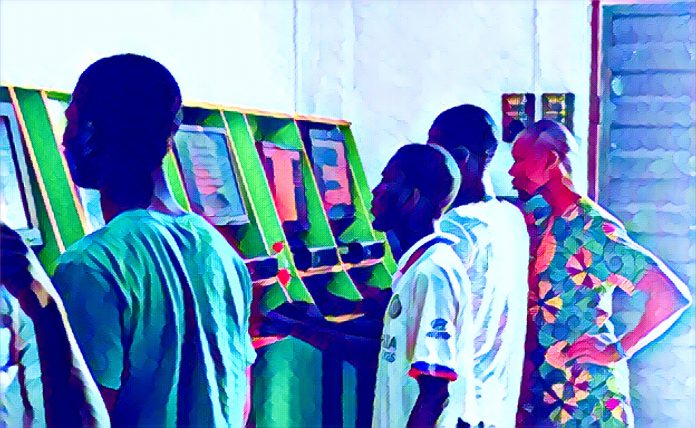KEY POINTS
-
Sports betting has become a survival tool for millions in Nigeria’s cities, particularly among unemployed youth.
-
While some see short-term financial relief, the practice fuels a cycle of dependency and financial instability.
-
Experts call for better regulation and alternative livelihood programs to address the root causes of urban poverty.
In the heart of Lagos, between the clatter of yellow buses and the rhythmic calls of street hawkers, rows of betting shops beam with bright screens displaying football odds from across the globe.
For many young Nigerians like 26-year-old Adamu Ibrahim, these shops are more than just places of chance—they are a daily ritual in the search for financial stability.
“I play every day because I don’t have a job. If I’m lucky, I can eat three times a day,” said Ibrahim, who dropped out of school due to a lack of funds. “Even ₦1,000 can be flipped into ₦10,000 if the game goes well.”
His story reflects a growing trend in Nigeria’s urban centers, where sports betting has evolved into a makeshift livelihood for thousands grappling with poverty, unemployment, and an economic system that increasingly fails to provide a safety net.
Betting shops rise where factories fall
In cities like Lagos, Kano, Port Harcourt, and Enugu, betting kiosks have replaced bookstores and mechanics’ stalls. The industry, valued at over ₦730 billion (approximately $500 million) annually, continues to grow rapidly, driven by mobile phone penetration, cheap internet data, and the national obsession with football—especially the English Premier League.
According to a 2024 report by the Nigerian Economic Summit Group, more than 60 million Nigerians aged 18 to 40 engage in some form of betting each week, with urban areas accounting for more than 70% of this traffic.
“Betting has become an urban economy on its own. It generates employment, rents, and daily subsistence,” said Dr. Temitope Fagbohun, a sociologist at the University of Ibadan. “But it also breeds cycles of false hope, financial addiction, and in some cases, criminality.”
While some players win occasionally, most lose repeatedly, leading to a dependency that critics say is exacerbating the country’s urban poverty crisis rather than solving it.
Despite the risks, many urban dwellers feel they have little choice. With the youth unemployment rate hovering above 40% and inflation climbing to 34% in April 2025, conventional income sources have become increasingly scarce.
In Ajegunle, one of Lagos’ most densely populated slums, betting shops often double as community centers. Young men gather to discuss strategy, share predictions, and momentarily escape the burdens of their environment.
“It’s better than stealing,” said 19-year-old Wasiu, who said he supports his younger siblings with occasional winnings. “The government is not doing anything for us.”
Critics, however, warn that normalizing betting among vulnerable populations carries long-term consequences. Mental health experts are concerned about rising cases of gambling addiction, debt, and depression, especially among youths.
In response, a few NGOs and religious organizations have begun offering financial literacy workshops and alternative income-generating opportunities. However, these efforts remain limited in reach compared to the expansive marketing budgets of betting companies.
Policy Vacuum and the Way Forward
While the National Lottery Regulatory Commission (NLRC) oversees the betting industry, enforcement of ethical standards is weak. Lawmakers have been slow to address the social implications of betting, and there is minimal investment in public awareness campaigns or addiction support services.
Analysts warn that without regulation or social safeguards, the booming betting culture could become a ticking time bomb for already fragile urban communities.
“Betting offers a temporary fix to systemic problems,” said Dr. Fagbohun. “But without sustainable economic reforms, it will continue to mask—rather than mend—the cracks in our social fabric.”



